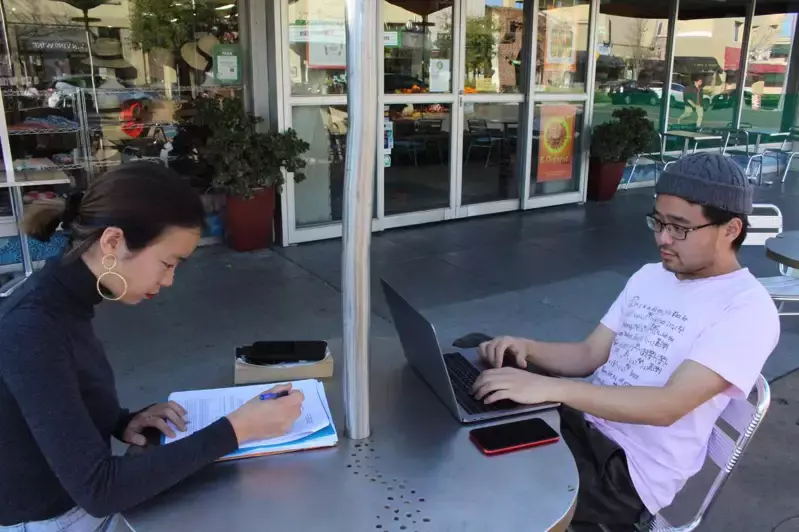DHS Expands Opportunities in U.S. for STEM Professionals
Release Date: January 21, 2022
Department adds Twenty-Two New Fields of Study and Takes Additional Steps to Attract Critical STEM Talent
The Department of Homeland Security (DHS) today announced 22 new fields of study have been added to the STEM Optional Practical Training (OPT) program to enhance the contributions of nonimmigrant students studying in the fields of science, technology, engineering, and mathematics (STEM), and support the growth of the U.S. economy and innovation.
“STEM innovation allows us to solve the complex challenges we face today and make a difference in how we secure and protect our country,” said Secretary Mayorkas. “Through STEM education and training opportunities, DHS is expanding the number and diversity of students who excel in STEM education and contribute to the U.S. economy.”
The STEM OPT program permits F-1 students earning bachelor’s, master’s, or doctoral degrees in certain STEM fields to remain in the United States for up to 36 months to work in their field of study. Adding 22 fields of study will ensure the U.S. economy benefits from students earning degrees in the United States in competitive STEM fields. Information on the new fields of study will be communicated to schools and students through a Federal Register notice.
DHS is also updating and issuing new U.S. Citizenship and Immigration Services (USCIS) policy manual guidance. USCIS is updating guidance to clarify how certain STEM graduates and entrepreneurs can use the national interest waiver for employment-based immigrant visa classification as an advanced degree professional noncitizen or noncitizen of exceptional ability.
Certain noncitizens with an advanced degree or exceptional ability can self-petition for employment-based immigrant visa classification, without testing the labor market and obtaining certification from the Department of Labor, if USCIS determines the waiver of the labor market test to be in the national interest. The updated guidance clarifies how to use the program, making it easier for noncitizens with needed skills, such as STEM graduates and entrepreneurs, to embark on a pathway to obtain lawful permanent resident status in the United States.
USCIS is also issuing a policy manual update related to O-1A nonimmigrant status for noncitizens of extraordinary ability in the fields of science, arts, education, business, or athletics. This update explains how USCIS determines eligibility for O-1A petitioners and, for the first time, provides examples of evidence that might satisfy the criteria, including for individuals working in STEM fields.
The 22 new fields of study are bioenergy, general forestry, forest resources production and management, human-centered technology design, cloud computing, anthrozoology, climate science, earth systems science, economics and computer science, environmental geosciences, geobiology, geography and environmental studies, mathematical economics, mathematics and atmospheric and oceanic science, general data science, general data analytics, business analytics, data visualization, financial analytics, other data analytics, industrial and organizational psychology, and social sciences, research methodology, and quantitative methods.
Last Published Date: January 21, 2022
与中抗衡 吸引国际理工生留美 工作期将延长为3年
世界新闻网
01/22/2022

拜登政府为了让科学、技术、工程及数学(science, technology, engineering and math,STEM)四大领域的外国留学生与国际专家长期留在美国,21日宣布现正展开一连串政策改革。
华尔街日报报导,硅谷高科技产业与其他美国企业对于希望留住国际人才呼吁已久,政府高层官员指出,拜登政府新政策主旨就是让在美国接受STEM教育的外国学生能留在美国,提升美国的创新实力,以便赶上中国等竞争对手的发展速度。
争取优秀国际学生的计划内容,公布于最新的「联邦公报」(Federal Register)。
拜登政府官员说,虽然政策改变多位技术层面,但对于让STEM毕业的外国留学生能在美国生活、工作,却是必要步骤,不至于让人才流失到移民制度更加友善的其他国家。
华尔街日报报导,最重大的改变将是开放更多学科的国际留学生,学业完成之后可以符合留美工作的资格;根据新规,某些STEM学科留学生毕业后将可在美国工作三年,与其他国际学生毕业后可在美国工作一年的现行规定不同。
报导指出,国土安全部计划将22个STEM学科,增列为国际学生毕业后可在美国参加三年实习许可计划(Optional Practical Training,OPT)的适用范围,数据科学(data science)、金融分析(financial analytics)、云端运算(cloud computing)、数据可视化(data visualization,又译数据可视化)均包括其中,政策改变立即生效。
另一项改变则是持J-1签证到美国进修的国际学生,学业完成后也可以在美工作最多三年,现行规定则为18个月。
国务院旗下的教育文化事务局(ECA)落实新规,允许持J-1签证到美国进修的国际学生,或者持非移民签证到美国参加学术交流访问计划的学术界人士,可以在美国学业实习(academic training)36个月。
美国政府独立机构「国家科学基金会」(NSF)本周公布报告指出,持临时签证来美进修的国际学生,占全美攻读经济、计算机科学、工程、数学及统计学博士学位学生逾半数。
USCIS Provides Clarifying Guidance for O-1 Petitions with a Focus on STEM Fields
Release Date 01/21/2022
U.S. Citizenship and Immigration Services today issued policy guidance clarifying how it evaluates evidence to determine eligibility for O-1A nonimmigrants of extraordinary ability, with a focus on petitions filed for individuals in science, technology, engineering, or math (STEM) fields, as well as how USCIS determines whether an O-1 beneficiary’s prospective work is within their area of extraordinary ability or achievement.
Individuals of extraordinary ability in the sciences, education, business, or athletics may be eligible for O-1A classification. The new update provides examples of evidence that may satisfy the O-1A evidentiary criteria and discusses considerations that are relevant to evaluating such evidence, with a focus on the highly technical nature of STEM fields and the complexity of the evidence often submitted.
The update also emphasizes that, if a petitioner demonstrates that a particular criterion does not readily apply to their occupation, they may submit evidence that is of comparable significance to that criterion to establish sustained acclaim and recognition, and it provides examples of possible comparable evidence that may be submitted in support of petitions for beneficiaries working in STEM fields.
In addition, the update explains that when evaluating whether an individual of extraordinary ability is coming to work in their “area of extraordinary ability,” officers will focus on whether the prospective work involves skillsets, knowledge, or expertise shared with the occupation(s) in which the individual garnered acclaim.
Visit the Policy Manual for Comment page to comment on this update. For more information, see the policy manual update (PDF, 363.79 KB).
Last Reviewed/Updated: 01/21/2022
USCIS Updates Guidance on National Interest Waivers
Release Date 01/21/2022
U.S. Citizenship and Immigration Services today announced updated guidance on adjudicating requests for “National Interest Waivers” regarding job offer and labor certification requirements for certain advanced degree professionals and individuals of exceptional ability. This includes discussing the unique considerations for persons with advanced degrees in science, technology, engineering, and math (STEM) fields and entrepreneurs.
Consistent with this Administration’s goal of removing barriers to legal immigration under President Biden’s Executive Order 14012, Restoring Faith in Our Legal Immigration Systems and Strengthening Integration and Inclusion Efforts for New Americans, USCIS is clarifying how the national interest waiver can be used by STEM graduates and entrepreneurs, as well as the significance of letters from governmental and quasi-governmental entities. The updated guidance also serves to promote effective and efficient processing of benefits consistent with the executive order.
An employer seeking to hire a noncitizen must generally obtain a permanent labor certification from the Department of Labor that proves there are no qualified U.S. workers for the position they are seeking and that their employment will not adversely affect similarly employed U.S. workers. The noncitizen may, however, seek a waiver of a job offer, and of the labor certification, if it is in the interest of the United States.
Individuals seeking a national interest waiver must show evidence of an advanced degree or exceptional ability and must also meet three factors that USCIS uses to determine, in its discretion, whether it is in the national interest that USCIS waive the requirement of a job offer, and thus the labor certification. The three factors USCIS considers for a national interest waiver are whether:
- The person’s proposed endeavor has both substantial merit and national importance;
- The person is well positioned to advance the proposed endeavor; and
- It would be beneficial to the United States to waive the job offer and thus the permanent labor certification requirements.
Those seeking a national interest waiver may self-petition using Form I-140, Immigrant Petition for Alien Worker.
This guidance, contained in Volume 6 of the Policy Manual, is effective immediately. The guidance contained in the Policy Manual is controlling and supersedes any related prior guidance.
Visit the Policy Manual for Comment page to comment on this update.
Last Reviewed/Updated: 01/21/2022
USCIS Conducts Third Random Selection from Previously Submitted FY 2022 H-1B Cap Registrations
Release Date 11/19/2021
We recently determined that we needed to select additional registrations to reach the fiscal year (FY) 2022 H-1B numerical allocations, including the advanced degree exemption. On Nov. 19, we selected from among previously submitted electronic registrations using a random selection process. The petition filing period based on registrations selected on Nov. 19 will begin on Nov. 22, 2021, and close on Feb. 23, 2022. Individuals with selected registrations will have their myUSCIS accounts updated to include a selection notice, which includes details about when and where to file.
In July 2021, we conducted a second random selection from among properly submitted electronic registrations for the FY 2022 H-1B numerical allocations. The petition filing period based on registrations selected in July ended on Nov. 3, 2021.
We conducted an initial selection in March 2021. The initial filing period for those with selected registrations for FY 2022 was from April 1, 2021, through June 30, 2021. Per regulation, we take into account historical data related to approvals, denials, revocations, and other relevant factors to calculate the number of registrations needed to meet the H-1B numerical allocations for a given fiscal year. Only those petitioners with selected registrations for FY 2022 are eligible to file H-1B cap-subject petitions.
An H-1B cap-subject petition must be properly filed at the correct service center and within the filing period indicated on the relevant registration selection notice. Online filing is not available for H-1B petitions. Petitioners filing H-1B petitions must do so by paper and must include a printed copy of the applicable registration selection notice with the FY 2022 H-1B cap-subject petition.
Registration selection only indicates that petitioners are eligible to file H-1B cap-subject petitions; it does not indicate that the petition will be approved. Petitioners filing H-1B cap-subject petitions, including those petitions eligible for the advanced degree exemption, must still submit evidence and establish eligibility for petition approval based on existing statutory and regulatory requirements.
For more information, visit the H-1B Cap Season page.
Last Reviewed/Updated: 11/19/2021
Employment authorization implemented for Hong Kong residents covered under Deferred Enforced Departure
By Berry Appleman & Leiden LLP
10/20/2021
U.S. Citizenship and Immigration Services (USCIS) provided information today on how Hong Kong residents covered by Deferred Enforced Departure (DED) apply for employment authorization.
Key Points:
- DED and employment authorization for noncitizens covered by DED for Hong Kong is effective from Aug. 5, 2021, through Feb. 5, 2023, except for noncitizens who:
- Have voluntarily returned to Hong Kong or the People’s Republic of China (PRC) after Aug. 5, 2021.
- Have not continuously lived in the U.S. since Aug. 5, 2021.
- Are inadmissible under the Immigration and Nationality Act.
- Have been convicted of any felony or two or more misdemeanors in the U.S.
- Are subject to extradition.
- Are considered a present danger to public safety or have potentially serious adverse foreign policy consequences for the U.S. if they remain in the country.
- USCIS said Wednesday that Hong Kong residents can apply for an Employment Authorization Document by submitting a completed Form I-765, Application for Employment Authorization.
- Individuals can apply for travel authorization by submitting, Form I-131, Application for Travel Document.
Additional Information: Eligibility requirements for Hong Kong residents who are covered by DED are based on the terms described in the President Joe Biden’s directive and any relevant requirements established by the Department of Homeland Security. The full USCIS announcement can be found here.
USCIS Implements Employment Authorization for Individuals Covered by Deferred Enforced Departure for Hong Kong Residents
Release Date: 10/20/2021
Eligible Hong Kong Residents May Apply for EADs and Travel Authorization
WASHINGTON — U.S. Citizenship and Immigration Services (USCIS) today issued a Federal Register notice with information on how to apply for employment authorization for eligible Hong Kong residents covered under the president’s Aug. 5 memorandum directing Deferred Enforced Departure (DED) for 18 months, through Feb. 5, 2023.
DED for Hong Kong residents applies only to certain eligible Hong Kong residents who were present in the United States as of Aug. 5, 2021; who have continuously resided here since that date; and who meet other eligibility criteria described in the president’s memorandum. For purposes of this DED policy, Hong Kong residents are individuals of any nationality, or without nationality, who have met the requirements and been issued a Hong Kong Special Administrative Region (HKSAR) passport, a British National Overseas passport, a British Overseas Citizen passport, a Hong Kong Permanent Identity Card, or an HKSAR Document of Identity for Visa Purposes.
There is no application for DED. Eligibility requirements for Hong Kong residents who are covered under DED are based on the terms described in the president’s directive and any relevant implementing requirements established by the Department of Homeland Security.
Eligible Hong Kong residents may apply for an Employment Authorization Document by submitting a completed Form I-765, Application for Employment Authorization. Eligible Hong Kong residents covered by the president’s DED memorandum may also receive travel authorization. Individuals must file Form I-131, Application for Travel Document, for advance parole if they wish to travel based on DED.
For more information on USCIS and its programs, please visit uscis.gov or follow us on Twitter, Instagram, YouTube, Facebook and LinkedIn.
Last Reviewed/Updated: 10/20/2021

北美法律公益讲座安排
时间:周二到周五 晚间
5:30-7:00(西部)
8:30-9:30(东部)
周二: 遗嘱和资产传承(蒋律师&Joanna)
周三: 数据泄露和个人身份保护&事业机会说明会
周四: 婚姻和家庭法(主讲周律师)
周五:企业法律问题公益讲座(主讲人:蒋律师&Joanna)& 事业机会说明会
Zoom 6045004698,
密码:进群获取

USCIS Extends Flexibility for Responding to Agency Requests
Release Date: 09/24/2021
In response to the coronavirus (COVID-19) pandemic, U.S. Citizenship and Immigration Services is extending the flexibilities it announced on March 30, 2020, to assist applicants, petitioners and requestors who are responding to certain:
- Requests for Evidence;
- Continuations to Request Evidence (N-14);
- Notices of Intent to Deny;
- Notices of Intent to Revoke;
- Notices of Intent to Rescind;
- Notices of Intent to Terminate regional centers; and
- Motions to Reopen an N-400 Pursuant to 8 CFR 335.5, Receipt of Derogatory Information After Grant.
In addition, USCIS will consider a Form I-290B, Notice of Appeal or Motion, or Form N-336, Request for a Hearing on a Decision in Naturalization Proceedings (Under Section 336 of the INA), if:
- The form was filed up to 60 calendar days from the issuance of a decision we made; and
- We made that decision anytime from March 1, 2020, through Jan. 15, 2022
Notice/Request/Decision Issuance Date:
This flexibility applies to the above documents if the issuance date listed on the request, notice or decision is between March 1, 2020, and Jan. 15, 2022, inclusive.
Response Due Date:
USCIS will consider a response to the above requests and notices received within 60 calendar days after the response due date set in the request or notice before taking any action. Additionally, we will consider a Form N-336 or Form I-290B received up to 60 calendar days from the date of the decision before we take any action.
Please visit uscis.gov/coronavirus for USCIS updates.
Last Reviewed/Updated: 09/24/2021
USCIS Extends Evidence of Status for Conditional Permanent Residents to 24 Months with Pending Form I-751 or Form I-829
Release Date: 09/03/2021
Starting Sept. 4, 2021, USCIS is extending the time that receipt notices can be used to show evidence of status from 18 months to 24 months for petitioners who properly file Form I-751, Petition to Remove Conditions on Residence, or Form I-829, Petition by Investor to Remove Conditions on Permanent Resident Status. We are making the change from 18 to 24 months to accommodate current processing times for Form I-751 and Form I-829, which have increased over the past year.
Conditional permanent residents who properly file Form I-751 or Form I-829 will receive a receipt notice that can be presented with their Form I-551, Permanent Resident Card (also known as a Green Card), as evidence of continued status for up to 24 months past the expiration date on their Green Card, while their case remains pending with USCIS.
Additionally, we will issue new receipt notices to eligible conditional permanent residents who properly filed their Form I-751 or Form I-829 before Sept. 4 and whose cases are still pending. Those receipt notices will also serve as evidence of continued status for 24 months past the expiration date on their Green Card.
As a reminder, conditional permanent residents who plan to be outside of the United States for a year or more should apply for a reentry permit by filing Form I-131, Application for Travel Document, before leaving the country. For more information on International Travel as a Permanent Resident, see our Green Card page.
Last Reviewed/Updated: 09/03/2021



